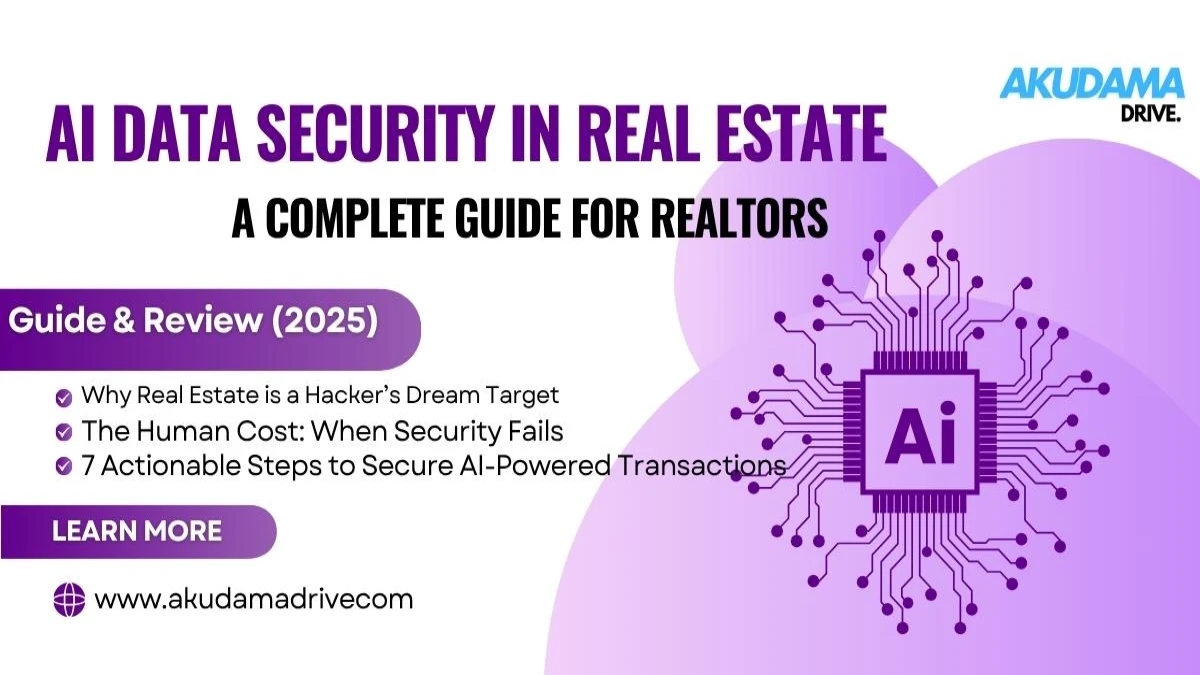🕒 Last updated on: August 1, 2025
AI Data Security in Real Estate: Protecting Your Clients’ Dreams (and Your Business)
Picture this: A young couple finally finds their dream home. They’ve shared everything with you—bank statements, Social Security numbers, even the layout of their current house for the sale listing. Now imagine that data falling into the wrong hands because of a cybersecurity gap in your AI tools.
This isn’t a hypothetical. As AI revolutionizes real estate—from instant valuations to automated contract reviews—it’s also creating new vulnerabilities. In an industry built on trust, securing client data isn’t just tech talk; it’s about protecting people’s lives and livelihoods. For more detailed security practices, check out our comprehensive guide to real estate security.
Why Real Estate is a Hacker’s Dream Target
Real estate transactions are a treasure trove for cybercriminals. Think about what’s in a single deal:
- 🔐Personal IDs: Driver’s licenses, SSNs, birthdates
- 💰Financial Gold: Bank accounts, credit reports, mortgage details
- 📜Legal Secrets: Deeds, titles, purchase agreements
- 🏠Physical Security: Smart home codes, floor plans, occupancy schedules
AI’s Double-Edged Sword: Efficiency vs. Exposure
AI is transforming real estate for the better:
- ✅Lightning-Fast Valuations: AI analyzes market trends, comps, and neighborhood data in seconds.
- ✅24/7 Client Support: Chatbots handle showings, emails, and FAQs while you sleep.
- ✅Error-Free Contracts: AI scans documents for missing signatures or compliance issues.
But here’s the catch: These tools need massive data to work. And that data is vulnerable. Hackers can:
- Poison AI Models: Feed false data to skew home prices or market predictions.
- Steal Training Data: Access confidential client info used to teach AI systems.
- Exploit Weak Links: Breach third-party tools (e-signatures, CRMs) to infiltrate entire brokerages.
The Human Cost: When Security Fails
Meet Sarah, a top agent in Austin. Her AI-powered CRM was hacked, exposing 200 clients’ financial records. Result?
- 💸$500K+ in legal settlements
- 😔Destroyed reputation
- ⚖️State regulatory fines
7 Actionable Steps to Secure AI-Powered Transactions
Forget complex tech jargon. Focus on these practical, human-centered strategies for AI Data Security in Real Estate:
1. Encrypt Like Your Business Depends on It (Because It Does)
- Use military-grade encryption (AES-256) for stored data and TLS 1.3 for data in motion.
- Pro Tip: Ask vendors if they offer “zero-knowledge encryption”—meaning only YOU hold the keys.
2. Lock the Digital Front Door
- Give staff minimum access needed for their role (principle of least privilege).
- Require multi-factor authentication (MFA) everywhere—email, CRMs, AI tools.
3. Vet AI Vendors Like You’d Vet a Business Partner
Before signing up, ask:
- Are you SOC 2 or ISO 27001 certified?
- Who owns our data if we leave?
- How fast will you notify us of a breach?
- Red Flag: If they dodge these questions, walk away.
4. Collect Only What You Need
- Train AI with anonymized or synthetic data when possible.
- Delete old client files—data hoarding is a liability.
5. Watch for Digital “Footprints”
Use AI monitoring tools to flag odd behavior:
- Sudden bulk downloads at 3 AM
- Logins from overseas
- Access to files outside someone’s role
6. Make Security Everyone’s Job
- Train agents to spot phishing emails (e.g., fake “wire transfer” requests).
- Run quarterly security drills—test how your team responds to a simulated breach.
7. Have a “Break Glass” Plan
If breached:
- Isolate affected systems immediately.
- Notify clients/regulators within legal deadlines (often 72 hours).
- Restore from encrypted backups.
The Future: AI as Your Security Partner
Ironically, AI itself can become your best defense in AI Data Security in Real Estate:
- 🛡️Predictive Threat Detection: AI spots attack patterns before humans can.
- 📋Automated Compliance: Tools scan transactions for GDPR/CCPA violations in real-time.
- 🤖Fraud-Fighting Chatbots: NLP tech detects suspicious language in emails or contracts.
But remember: AI is only as smart as the humans guiding it.
Why This Matters More Than Ever
In real estate, you’re not just selling properties—you’re safeguarding dreams. A data breach doesn’t just cost money; it shatters trust. And in this industry, trust is your currency.
By prioritizing AI Data Security in Real Estate, you’re not just avoiding risk—you’re building a reputation as the agent who truly protects clients. That’s how you win referrals, repeat business, and Google rankings.
Key Takeaways (For Busy Readers)
| Risk | Solution |
|---|---|
| Centralized data attracts hackers | Encrypt everything + limit access |
| Third-party AI tools are weak links | Vet vendors rigorously |
| Staff accidentally leak data | Train + monitor continuously |
| Compliance fines hurt profits | Use AI for automated checks |






